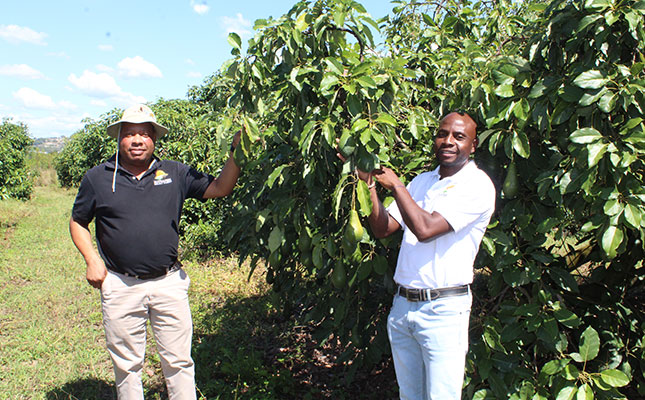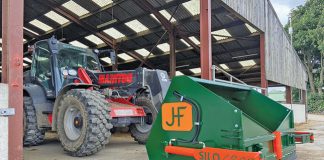
Photo: Lindi Botha
The Mataffin farm on the outskirts of Mbombela in Mpumalanga was one of the first in the area to be transferred back to the original owners in 2003 as part of South Africa’s land restitution programme.
The Mdluli clan occupied the land around 1840, when their leader, Matsafeni Mdluli, a Swazi chief, conquered the area. After the Native Land Act was passed in 1913, the clan was removed from the land.
Ownership thereafter changed several times before the land was bought by HL Halls & Sons, which is today synonymous with avocado production.
By the time the farm was bought by government and returned to the Mdluli clan, many decades of farming had completely transformed the landscape.
Thriving avocado, litchi and pecan nut orchards now covered the land, delivering an export crop with significant value. While the clan rejoiced at their victory in claiming back their ancestral land, the challenges that lay before them were evident.
Tom Mdluli, one of the members of the Mdluli clan, explains: “Initially, the workers who were living on the land and employed by Halls were included in the landownership trust. This brought the number of households in the trust to 1 500. We faced tremendous infighting and it was incredibly difficult to run the business.”
The sheer number of beneficiaries also means that the business has yet to declare dividends.
Smaller is better
After a lengthy court battle, where it was argued that the workers were not the original owners of the land, the trust was reduced to only those of the Mdluli clan.
The workers were given their own land to operate independently of the Mdlulis. Mdluli says this has made running the business far easier and there is hope that a dividend will be paid this year.
Nonetheless, dealing with a family still large enough to produce many differing opinions meant that the process was not entirely streamlined.
The family therefore took another decision that has eased doing business: creating an operating company responsible for running the farms independently of the trust. The company has a board of directors comprising some Mdluli clan members and a few independent outsiders.
“Only these directors are able to call meetings and make decisions, which has eliminated the problem of various trust members calling a general meeting every time there was an issue that needed to be discussed, and thereby delaying decisions and production,” says Mdluli.
Another all too familiar challenge faced by land beneficiaries is a lack of capital. This issue, however, has been far more difficult to solve. Mdluli laments that when farms are given back to the original owners by government, no financing or operating capital is made available.
“Yet, as is often the case and certainly so in ours, we received a farm that’s hugely expensive to run. It can’t all go to ruin; it’s a farm that employs hundreds of workers, provides food for the people in the region, and earns foreign income from exports. How do we proceed when there are no finances for the inputs and salaries?”
Obtaining credit from commercial banks has remained out of reach. Ashleigh Hamilton-Foule, Matsafeni Farms’ operations manager, notes that the lack of credit provision from commercial banks is not a problem unique to the Mdlulis.
“It’s widespread across South Africa. Banks seldom provide a loan to a land restitution farm, and if they do grant it, the amount is so small it’s not justified against the turnover of the farm.”
Hamilton-Foule says that despite asking banks several times why they were so reluctant to give credit to such farms, he is yet to receive a straight answer.
To overcome the challenge of lacking farming expertise, the Mdlulis entered into an agreement with former owners HL Halls & Sons to run the farm. During the first year the Mdlulis took over, Halls leased all the properties.
As the years went by, it gradually decreased the area under its management, to where everything is under Mdluli management today. Halls also provided a loan for operating costs, overcoming the challenge with the banks.
In addition, Halls is contracted to provide certain services on the farm, such as crop protection, harvesting, packing and marketing.
The Mdlulis have not had to erect a packhouse, and they are also able to benefit from the Halls marketing team, which operates marketing offices globally.
Escalating production costs
Avocado production costs are high across the industry, with Hamilton-Foule estimating annual expenditure at R80 000/ha to R200 000/ ha. Moreover, recent challenges experienced across the agriculture sector are compounding the issues faced by the Mdlulis in their effort to achieve greater profitability.
One of the main contributors to escalating production costs is load-shedding. This has had far-reaching consequences for the business, as its irrigation systems require electricity to pump water.
“We have to pay staff overtime wages to come in to manage the irrigation when the lights are on. Every step of the production process that requires power loses productivity when the electricity is off.
So not only are production costs higher with the overtime we need to pay, but we’ll certainly see a drop in yield this year, because we couldn’t irrigate when we were supposed to,” says Hamilton-Foule.
While many farmers are turning to solar power, the lack of credit means that the Mdlulis are unable to shoulder such an investment at this point. Hamilton-Foule adds that any kind of investment in new technology comes at a cost that is not easy to bear when a farm is still working towards greater profitability.
In this way, the farm is being doubly disadvantaged in that it is unable to finance the very improvements that would increase yields and efficiencies and thereby profit.
“At this stage, we have to carefully consider any new investment to weigh up the costs and the benefits. This includes certifications for certain markets that can come at a substantial extra cost, but doesn’t necessarily increase your market. Everything at this point is focused on optimising the finances we do have to achieve the maximum output, fine-tuning production practices, and focusing on what works.”
The farm’s avocado yield averages 12t/ha, with some orchards going as high as 22t/ha, while others not yet in full production dip to 5t/ha.
Hamilton-Foule adds that the farm also faces decreased prices as the global economic downturn and rising avocado volumes from Peru affect demand and supply.
“Another big risk is theft, which often takes a whole orchard’s crop out of the total harvest.”
While the local market has remained stagnant in its demand, Mdluli notes that the hawker market is increasing its uptake of fruit.
This is due to high unemployment, which not only pushes more people towards street-side trading, but means that poorer consumers tend to buy a single avocado from a hawker rather than a box in a supermarket.
Learning curves
Being new to farming means having to learn from your mistakes. Mdluli has been careful to do so, and refocus the business accordingly.
He notes, for example, that buying inputs from reputable suppliers was a lesson learnt early on.
“With fertilisers being one of the highest costs in the business, it’s important to shop around for prices. One year, however, we took a chance on lower-priced fertiliser. But when we had it analysed, we realised it didn’t contain the nutrients it was supposed to. In today’s market, you can’t take a chance on inferior products and jeopardise your yield.”
Another change has been the move away from harsh chemicals to those that are either biological or adhere to the maximum residue levels (MRLs) of export markets.
“You need a far more comprehensive strategy for managing pests in the orchard,” says Mdluli. “Gone are the days when you just went in and sprayed whichever chemical would eliminate the problem fastest. Now you have to box clever. The last thing you want to do is send fruit to Europe and have the consignment rejected because there are chemical residues that exceed the MRLs.”
The farm relies heavily on research conducted by the South African Avocado Growers’ Association, which keeps farmers abreast of any changes in MRLs and new products that provide better results for crop protection. The organisation is also key to opening up new markets.
Optimism for the future
Despite the challenges, the Mdlulis are positive about the future prospects of their farm. So much so, that they are planning an expansion project with HL Halls & Sons in a joint venture.
“This is exciting because it will increase our avocado orchards significantly, and we’ll be planting other crops, like macadamias. Through this, we’ll be able to employ more beneficiaries while increasing our turnover. This should mean we can pay dividends to our shareholders in the near future,” says Mdluli.
He adds that the necessity of economies of scale means that expansion is non-negotiable.
“It’s not sustainable to farm on a small scale. In the avocado industry, for example, if you have less than 50ha you won’t make it. What happens if you get a big hailstorm and the whole farm is affected? You need to spread your risk over more land in different areas. This is the kind of issue that will be addressed through expansion.”
Despite the current price slump, Mdluli is optimistic about avocado prices in the future.
“Having the right spread of varieties will ensure better market uptake. While the export market prefers Hass, local markets prefer green skins. Since 90% of our orchards are green skins, we’ll be expanding with Hass varieties.”
Mdluli concludes that remaining viable over the past 20 years has been challenging, but having the right partners and relationships with experts has seen the business through.
“As a family, we’re committed to making a success of this farm. We all feel that ownership and farming is our priority. The country needs food and we can provide it. But success hinges on assistance from government and the private sector, and if land beneficiaries don’t get assistance, we’ll just stagnate.”
Email Ashleigh Hamilton-Foule at [email protected].










